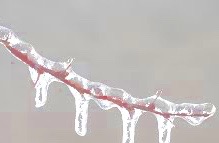Winter is here and the short term forecast calls for near-record low temperatures. With temperatures plummeting to dangerous levels, the District would like to impart the following information as water pipes can be particularly vulnerable to sudden prolonged cold spells.
Every school science textbook teaches that water expands as it freezes. This expansion exerts tremendous pressure on both plastic and metal pipes. At particularly cold times the pressure can be so great that the pipes can fracture and burst. And that is not limited to outdoor pipes, hoses, spigots, water sprinkler lines and the like.
Unheated interior areas put pipes at great risk for damage. Crawl spaces and unheated basements, attics and garages, even kitchen cabinets can be problematic. Pipes that run against exterior walls can also freeze, especially when they are uninsulated or poorly insulated.

Taking Preventive Action Can Save Your Pipes!
- Always know where your water service turn off valve is located, just in case you might need to access it in an emergency…like burst pipes.
- Examine the exterior of your house and around your property for potential freezing problems.
- Have a balcony with drains? Make sure they are free from leaves and other debris that could clog them and encourage ice damming.
- Be smart. Open your kitchen and bathroom cabinet doors. That way you will allow warmer air from the room to circulate around the interior plumbing. This actually can make the difference between free flowing and freezing pipes, especially on cold winter nights. (And be sure to move harmful household cleaners and chemicals out of the reach of children).
- Garages are generally unheated, so keeping garage doors closed helps big time.
- Wrap your pipes carefully. The tape ends should be butted tightly and the joints wrapped with a proper insulating tape.
- Insulate all your pipes, especially in your basement. Pipe sleeves or UL-listed heat tape can be lifesavers (or at least pipe savers!)
- Maintain the same house temperature day and evenings. Yes, this may may well result in a higher heating bill; but if your pipes freeze, expand and burst you’ll encounter far more costly repair bills for the plumbing, damages to the rooms they are located in… not to mention a great deal of headaches and aggravation to boot!
- Keep faucets slightly open.
- Attention all snow birds! Are you snow birding or simply traveling? Either way, don’t turn the heat off! That’s a virtual guarantee of frozen pipes. Make sure to leave the heat on…and no lower than 55 ºF…to discourage freezing. Never take chances with frozen pipes. It just doesn’t pay.
- Close the outside hose spigot valve in your basement.



